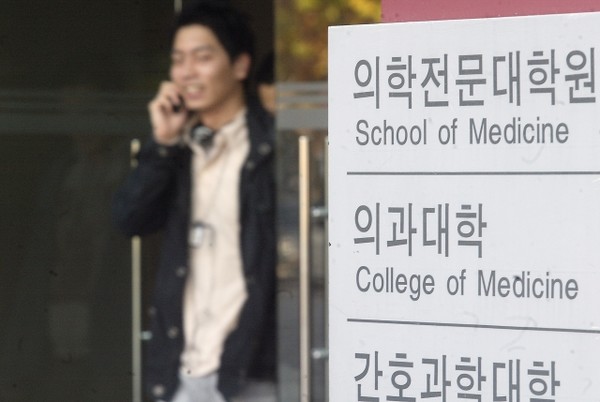More universities and local governments are pushing for establishing new medical schools.
However, the Korean Medical Association (KMA) said the nation needs legislation to shut down insolvent medical schools and curb expanding new medical schools.

The doctors’ group also asserted that the nation needs to reduce medical school admission quotas.
On Thursday, the KMA said it had completed its plan for “an appropriate supply of doctors” after collecting opinions from affiliated groups.
The plan came after the Ministry of Health and Welfare requested the KMA to submit opinions on the university admission adjustment plan for 2023. The KMA is soon to submit the plan to the health and welfare ministry.
Mokpo National University, Kongju National University, Sunchon National University, Daejin University, and POSTECH push to set up new medical schools jointly with local governments.
Korea’s doctor-to-patient ratio to exceed OECD average after 2037
The KMA said nurturing physicians should be free from politics.
The government should draw up a plan to advance healthcare under the Framework Act on Health and Medical Service and then discuss the appropriate supply of doctors, the KMA said.
The KMA argued that medical school admission quotas should be gradually pushed down starting from 2022 because the population per clinician was decreasing.
“In Korea, the number of clinicians per 1,000 population is rising on the supply side, but the number of Korean people per doctor is declining on the demand side,” the KMA said.
The supply of physicians is expected to climb steadily, and the doctor-to-patient ratio is predicted to surpass the OECD average after 2037, it added.
Given the shrinking population caused by low birth rates, it is highly likely that there will be too many doctors for the Korean people in the future, the KMA said.
Also, Korea has a high physician density compared to the size of the land, which gives patients relatively more access to doctors among OECD members, the KMA went on to say.
The government’s policy to increase the number of physicians “under the pretext of addressing regional imbalances” could raise doctor density even further.
Therefore, the government should develop a plan to lower medical school admissions and implement the plan from 2022, the KMA emphasized.
‘Transfer of political power led to more new medical schools’
The KMA also said the nation needs to institutionalize integrating or closing insolvent medical schools and suppress setting up new ones.
In Korea, the transition of political power generated more new medical schools and led to a bill's proposal on the establishment of a public medical school, the KMA said.
“Damages incurred by the inconsistent policy on the supply of doctors are inflicted on healthcare service providers and consumers,” it said.
Although it is difficult to reverse the past policy that allowed low-performing medical schools to build more facilities, the oversupply of doctors and its “social side effects” could cause more costs, the doctors’ group said.
To prevent producing insolvent medical schools and optimize the supply and demand of physicians, the nation needs legislation to limit the qualification of graduates of low-performing medical schools to take the state medical exam and discourage the establishment of new medical schools, it added.
The KMA also proposed setting up governance for scientific doctor supply and transparent decision-making.
The government can establish a body dedicated to managing the supply and demand of doctors, and stakeholders such as the KMA can offer advice, it said.
“Korea has no valid method for the estimation of the supply and demand of physicians,” the KMA said. “It is necessary to establish a predictable and scientific estimation model and build transparent governance for supply and demand policy decisions.”

